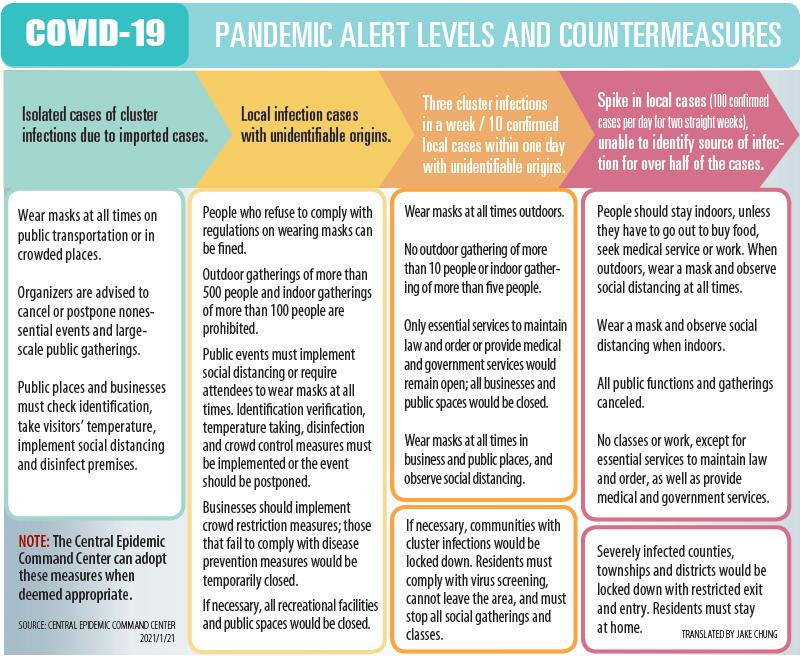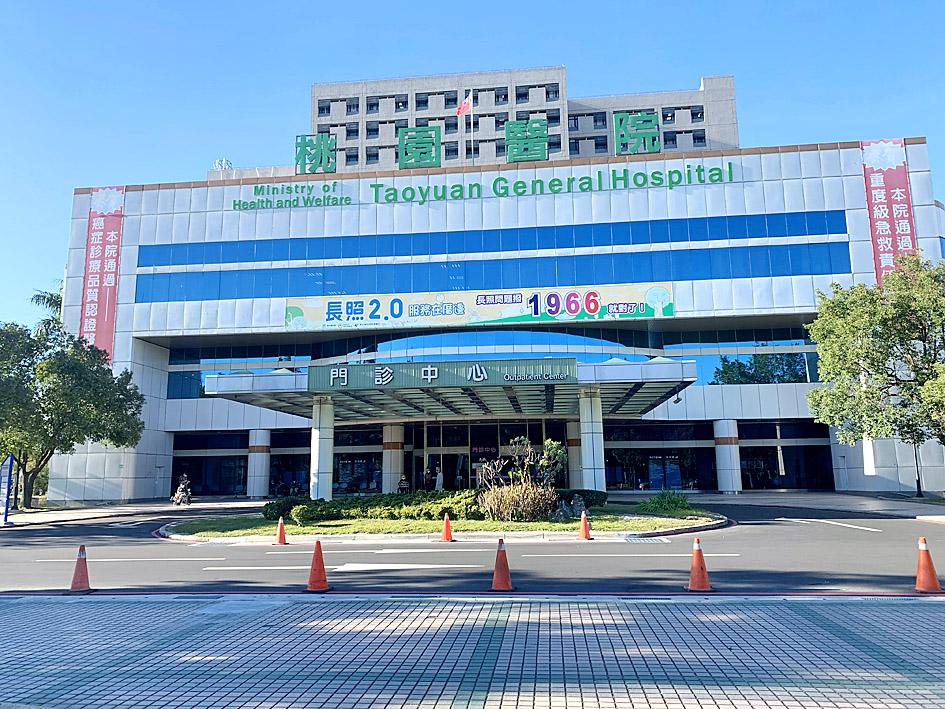A city-wide lockdown is a measure of last resort, the Central Epidemic Command Center (CECC) said yesterday, adding that the cluster of COVID-19 infections at the Ministry of Health and Welfare’s Taoyuan General Hospital has not reached that level.
With 10 cases reported from among the hospital’s workers and their relatives, some people, including Chinese Nationalist Party (KMT) members, are asking whether the center should consider locking down Taoyuan to prevent further spread of the virus.
The CECC yesterday reported two more cases imported from the Philippines and one from Denmark, but no more from the hospital.

The hospital cluster has prompted authorities to place 564 people in isolation.
Clarifying the steps that would be taken before a possible lockdown, Minister of Health and Welfare Chen Shih-chung (陳時中), who heads the center, told a news briefing in Taipei that it is difficult to say when the cluster case could be closed.
The cluster infection at the hospital falls under the center’s first alert level, which is having isolated cases of cluster infection due to imported cases, he said.

Photo: Chen En-hui, Taipei Times
The second alert level is when locally transmitted cases appear that have unknown sources of infection, while the third alert level is when there are three cluster infections within one week, or 10 local cases within one day with unknown origins of infection.
The fourth alert level is when there are 100 confirmed cases per day for two consecutive weeks, with more than half of those infected having unknown sources of infection.
In the fourth level, people should not leave their residences unless absolutely necessary and must observe social distancing, Chen said, adding that people should wear masks and observe social distancing indoors.
All gatherings would be suspended, and all work and classes suspended, unless they are occupations related to everyday life, maintaining law and order, healthcare and medical services, and civil services, Chen said.
Counties, townships and districts with severe pandemic infection rates would be locked down with restricted exit and entry, Chen said, adding that residents would need to stay at home.
However, the nation is only at the first alert level, and people only need to wear masks on public transportation and in crowded areas, Chen said.
An analysis of five patients in the hospital cluster infection found that they carry the L452R and D614G mutations, the center said.
The WHO has not yet designated the L452R strain, discovered in California, as a new variant.
However, only further research would tell whether L452R has a faster infection rate, said Shih Shin-ru (施信如), director of Chang Gung University’s Research Center for Emerging Viral Infections.

A magnitude 7.0 earthquake struck off Yilan at 11:05pm yesterday, the Central Weather Administration (CWA) said. The epicenter was located at sea, about 32.3km east of Yilan County Hall, at a depth of 72.8km, CWA data showed There were no immediate reports of damage. The intensity of the quake, which gauges the actual effect of a seismic event, measured 4 in Yilan County area on Taiwan’s seven-tier intensity scale, the data showed. It measured 4 in other parts of eastern, northern and central Taiwan as well as Tainan, and 3 in Kaohsiung and Pingtung County, and 2 in Lienchiang and Penghu counties and 1

A car bomb killed a senior Russian general in southern Moscow yesterday morning, the latest high-profile army figure to be blown up in a blast that came just hours after Russian and Ukrainian delegates held separate talks in Miami on a plan to end the war. Kyiv has not commented on the incident, but Russian investigators said they were probing whether the blast was “linked” to “Ukrainian special forces.” The attack was similar to other assassinations of generals and pro-war figures that have either been claimed, or are widely believed to have been orchestrated, by Ukraine. Russian Lieutenant General Fanil Sarvarov, 56, head

‘POLITICAL GAME’: DPP lawmakers said the motion would not meet the legislative threshold needed, and accused the KMT and the TPP of trivializing the Constitution The Legislative Yuan yesterday approved a motion to initiate impeachment proceedings against President William Lai (賴清德), saying he had undermined Taiwan’s constitutional order and democracy. The motion was approved 61-50 by lawmakers from the main opposition Chinese Nationalist Party (KMT) and the smaller Taiwan People’s Party (TPP), who together hold a legislative majority. Under the motion, a roll call vote for impeachment would be held on May 19 next year, after various hearings are held and Lai is given the chance to defend himself. The move came after Lai on Monday last week did not promulgate an amendment passed by the legislature that

FOREIGN INTERFERENCE: Beijing would likely intensify public opinion warfare in next year’s local elections to prevent Lai from getting re-elected, the ‘Yomiuri Shimbun’ said Internal documents from a Chinese artificial intelligence (AI) company indicated that China has been using the technology to intervene in foreign elections, including propaganda targeting Taiwan’s local elections next year and presidential elections in 2028, a Japanese newspaper reported yesterday. The Institute of National Security of Vanderbilt University obtained nearly 400 pages of documents from GoLaxy, a company with ties to the Chinese government, and found evidence that it had apparently deployed sophisticated, AI-driven propaganda campaigns in Hong Kong and Taiwan to shape public opinion, the Yomiuri Shimbun reported. GoLaxy provides insights, situation analysis and public opinion-shaping technology by conducting network surveillance